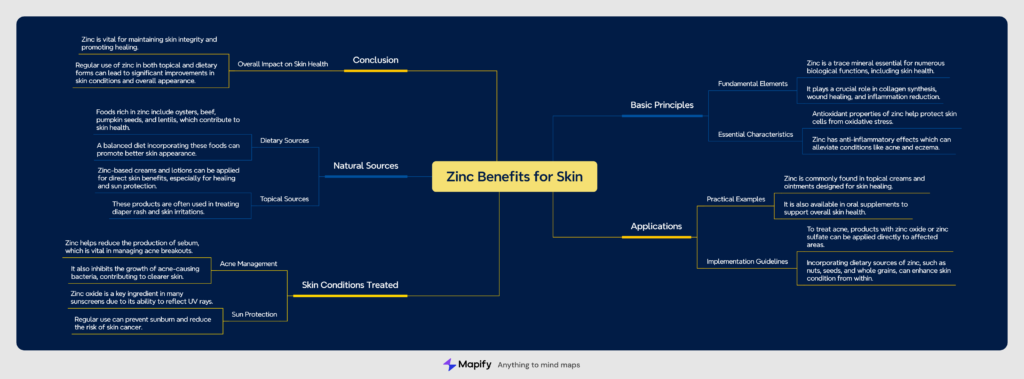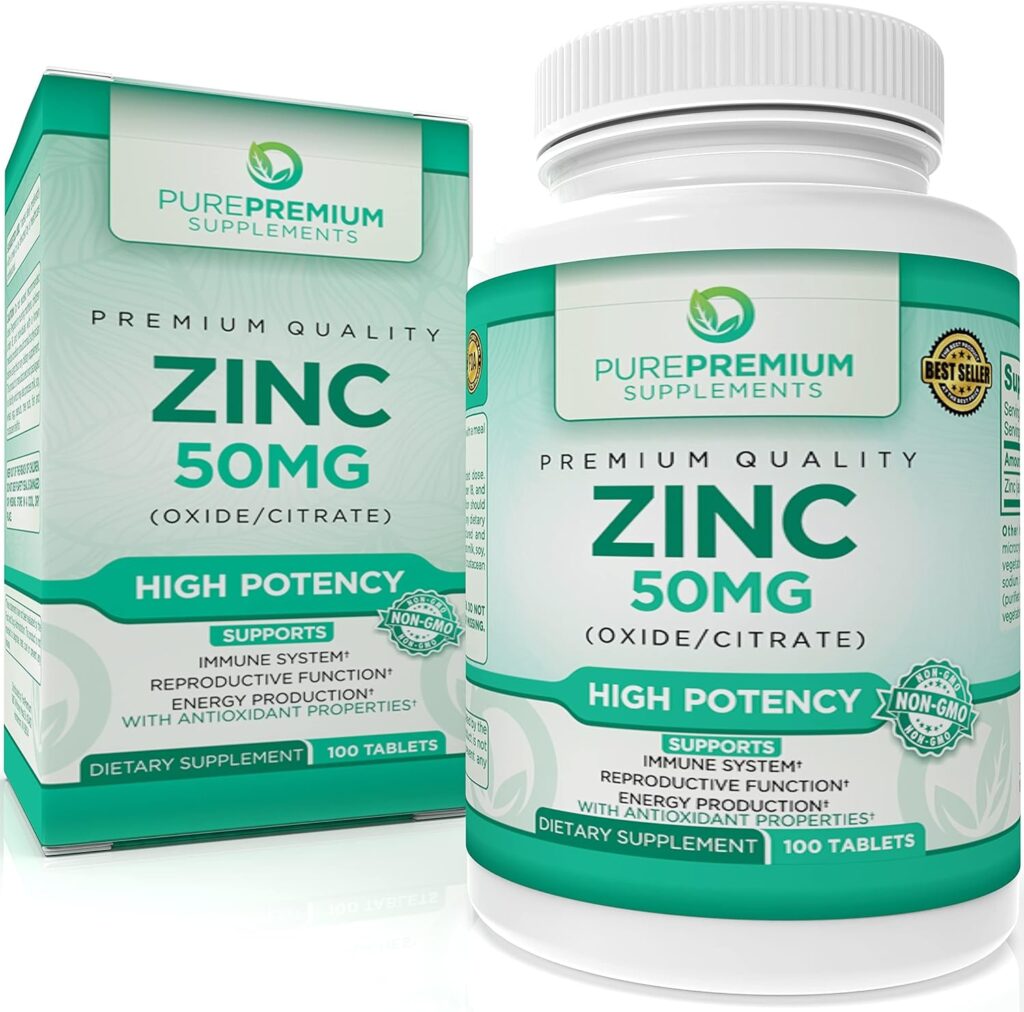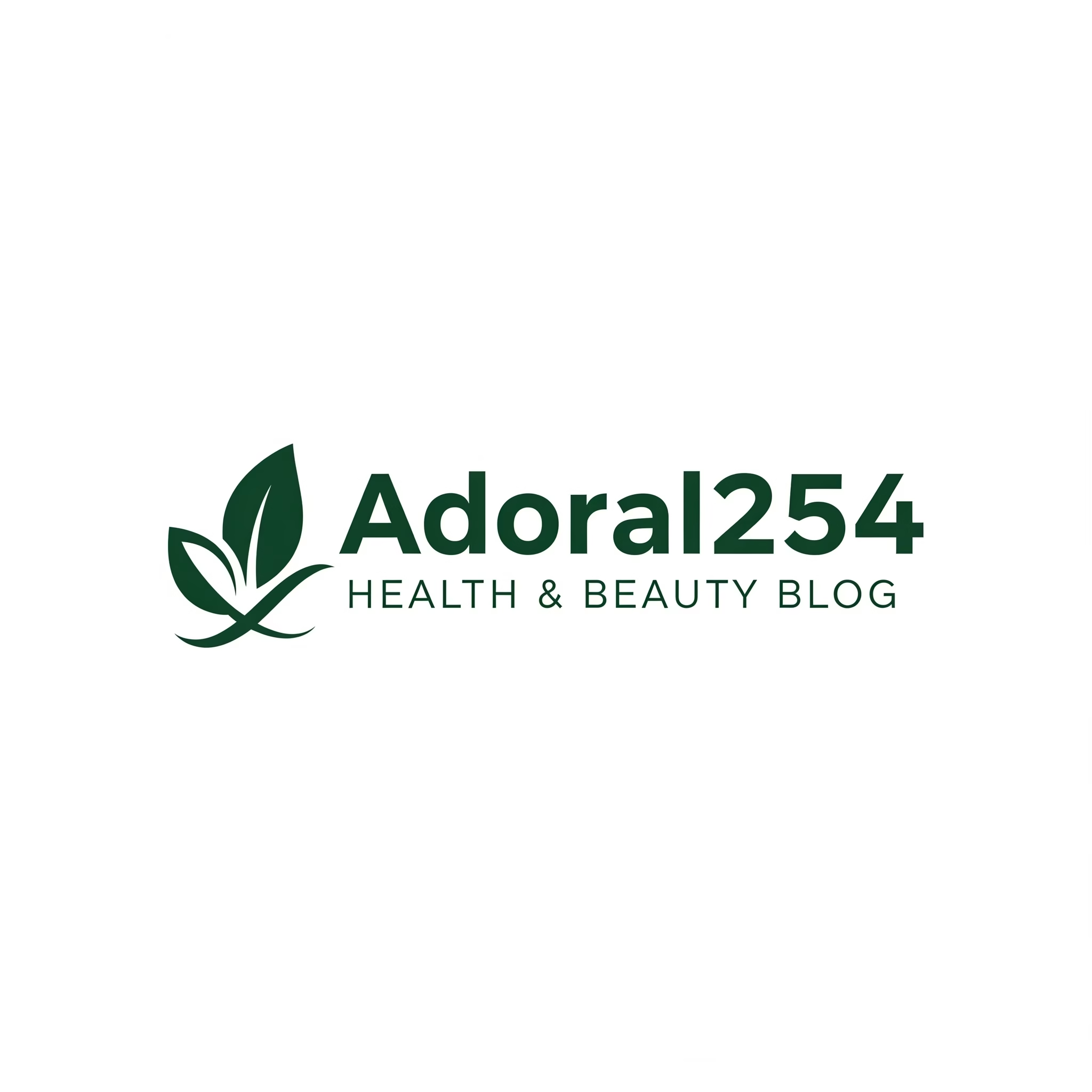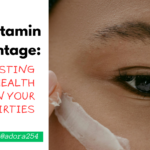Skincare issues like acne and persistent breakouts can be frustrating and often feel like they have no clear solution. While there are countless products claiming to work miracles, many overlook the role of nutrients in skin health. Zinc, an essential mineral, has been gaining attention for its ability to support clear, healthy skin. But how exactly does it help, and how can you make the most of Zinc Benefits for Skin? Let’s break it down.

The Role of Zinc in Skin Function
Zinc may not be the first thing that comes to mind when you think of skincare, but it plays a powerful role in maintaining your skin’s health. This multitasking mineral supports essential processes like oil regulation, wound healing, and reducing inflammation, all of which are key for a clear complexion.
Regulation of Oil Production
One of the primary contributors to acne is excess oil, or sebum, on your skin. Zinc works behind the scenes to regulate the activity of sebaceous glands, which produce sebum. By keeping oil production balanced, zinc prevents pores from clogging, reducing the risk of breakouts. It’s like a traffic cop for your skin, ensuring everything flows smoothly without causing a buildup.
Wound Healing and Skin Repair
If you’ve ever struggled with acne scars or slow-healing blemishes, zinc might be the missing ingredient in your routine. This mineral supports the production of collagen, a protein critical for repairing damaged skin. Zinc’s ability to boost tissue repair and regenerate skin cells means it helps fade acne marks more quickly, leaving your skin looking refreshed.
Anti-Inflammatory Properties
Skin inflammation often worsens acne, leading to redness, swelling, and irritation. Zinc has powerful anti-inflammatory effects, helping to calm your skin and reduce the discomfort from inflamed pimples or cysts. Think of it as nature’s soothing balm, relieving the pain and itchiness that come with breakouts.
Types of Zinc and Their Benefits for Skin
Zinc can benefit your skin both inside and out. To get the best results, it’s important to know the differences between topical and dietary zinc, plus the foods and skincare products that can help you include it.
Topical Zinc vs. Dietary Zinc
Topical zinc is often used in creams or ointments to target specific skin issues like acne or irritation. It works right where you need it, soothing inflammation and protecting the skin’s barrier. On the other hand, dietary zinc supports your skin from within by fueling the processes that keep it healthy.
Both are effective, but which is better depends on your needs. If you’re looking to treat existing acne, topical zinc might be a great option. For overall glow and health, dietary zinc provides a strong foundation.

Get your daily dose of zinc here.
Common Food Sources of Zinc
Adding zinc-rich foods to your diet is one of the easiest ways to ensure your skin benefits from this mineral. Foods such as:
- Oysters (one of the highest sources of zinc)
- Nuts, like cashews and almonds
- Seeds, especially pumpkin and sunflower seeds
- Beans and lentils
- Meat, like chicken and beef
- Dairy products, like cheese and yogurt
Incorporating these foods into meals not only benefits your skin but also supports your overall health.
Zinc in Skincare Products
Many skincare brands incorporate zinc into their products, especially those targeting oil control or acne relief. Zinc oxide is a common ingredient in sunscreens, known for protecting against harmful UV rays while being gentle on sensitive skin. Other anti-acne treatments often combine zinc with active ingredients like salicylic acid to fight blemishes. Look for products labeled “zinc-based” or “non-comedogenic” when building a routine.
Scientific Evidence Linking Zinc and Clear Skin
Science backs up zinc’s role in improving skin health. Researchers have studied how zinc influences acne and other skin issues, and the results are promising.
Zinc Deficiency and Skin Problems
Zinc deficiency is often linked to common skin issues. Without enough zinc, the skin struggles to repair itself, resulting in delayed healing and an increased likelihood of acne. Deficiency can also lead to imbalances in oil production, making breakouts more frequent and severe.
Clinical Studies on Zinc for Acne
Several studies highlight the benefits of zinc for acne sufferers. For instance, research shows that zinc supplementation can reduce the severity of both inflammatory and non-inflammatory acne. This makes zinc a popular recommendation for those who want a less harsh, more natural way to manage breakouts.
How to Incorporate Zinc for Better Skin
Adding zinc to your skincare and wellness routine doesn’t have to be complicated. Whether you’re making dietary changes, trying supplements, or using topical treatments, small adjustments can make a big difference.
Recommended Daily Intake of Zinc
For adults, the recommended daily intake of zinc is about 8-11 mg, depending on gender. It’s important to stay within the recommended dose, as too much zinc can interfere with the absorption of other minerals like copper. Talk to a doctor or nutritionist before drastically changing your zinc intake to avoid potential side effects.
Zinc Supplements: What to Look For
If you’re considering supplements, opt for high-quality options such as zinc gluconate or zinc picolinate. Check that the supplement doesn’t exceed 40 mg per day unless advised by a healthcare provider. And while supplements can be effective, they should complement—not replace—a balanced diet.
Combining Zinc with Other Nutrients for Skin Health
Zinc works best when paired with other skin-supporting nutrients. Vitamins C and E are great examples. They work alongside zinc to fight free radicals, promote collagen production, and improve healing. Adding a multivitamin with these nutrients can maximize your efforts for clear, glowing skin.
Conclusion
Zinc is a powerful yet often overlooked ally in the fight for healthy, breakout-free skin. Whether you’re balancing oil production, reducing redness, or healing scars, this mineral offers unique benefits. By incorporating zinc through diet, skincare products, or supplements, you can give your skin the support it needs to thrive. Always consult a healthcare professional or dermatologist before making major changes—your skin will thank you for it.





**mindvault**
mindvault is a premium cognitive support formula created for adults 45+. It’s thoughtfully designed to help maintain clear thinking
**sugarmute**
sugarmute is a science-guided nutritional supplement created to help maintain balanced blood sugar while supporting steady energy and mental clarity.
**glpro**
glpro is a natural dietary supplement designed to promote balanced blood sugar levels and curb sugar cravings.
**vitta burn**
vitta burn is a liquid dietary supplement formulated to support healthy weight reduction by increasing metabolic rate, reducing hunger, and promoting fat loss.
**prodentim**
prodentim an advanced probiotic formulation designed to support exceptional oral hygiene while fortifying teeth and gums.
**glucore**
glucore is a nutritional supplement that is given to patients daily to assist in maintaining healthy blood sugar and metabolic rates.
**synaptigen**
synaptigen is a next-generation brain support supplement that blends natural nootropics, adaptogens
**sleeplean**
sleeplean is a US-trusted, naturally focused nighttime support formula that helps your body burn fat while you rest.
**nitric boost**
nitric boost is a dietary formula crafted to enhance vitality and promote overall well-being.
**prostadine**
prostadine is a next-generation prostate support formula designed to help maintain, restore, and enhance optimal male prostate performance.
**wildgut**
wildgutis a precision-crafted nutritional blend designed to nurture your dog’s digestive tract.
**mitolyn**
mitolyn a nature-inspired supplement crafted to elevate metabolic activity and support sustainable weight management.
**zencortex**
zencortex contains only the natural ingredients that are effective in supporting incredible hearing naturally.
**yusleep**
yusleep is a gentle, nano-enhanced nightly blend designed to help you drift off quickly, stay asleep longer, and wake feeling clear.
**breathe**
breathe is a plant-powered tincture crafted to promote lung performance and enhance your breathing quality.
**pineal xt**
pinealxt is a revolutionary supplement that promotes proper pineal gland function and energy levels to support healthy body function.
**energeia**
energeia is the first and only recipe that targets the root cause of stubborn belly fat and Deadly visceral fat.
**prostabliss**
prostabliss is a carefully developed dietary formula aimed at nurturing prostate vitality and improving urinary comfort.
**boostaro**
boostaro is a specially crafted dietary supplement for men who want to elevate their overall health and vitality.
**potentstream**
potentstream is engineered to promote prostate well-being by counteracting the residue that can build up from hard-water minerals within the urinary tract.
**hepato burn**
hepato burn is a premium nutritional formula designed to enhance liver function, boost metabolism, and support natural fat breakdown.
**hepatoburn**
hepatoburn is a potent, plant-based formula created to promote optimal liver performance and naturally stimulate fat-burning mechanisms.
**flow force max**
flow force max delivers a forward-thinking, plant-focused way to support prostate health—while also helping maintain everyday energy, libido, and overall vitality.
**prodentim**
prodentim is a forward-thinking oral wellness blend crafted to nurture and maintain a balanced mouth microbiome.
**neuro genica**
neuro genica is a dietary supplement formulated to support nerve health and ease discomfort associated with neuropathy.
**cellufend**
cellufend is a natural supplement developed to support balanced blood sugar levels through a blend of botanical extracts and essential nutrients.
**revitag**
revitag is a daily skin-support formula created to promote a healthy complexion and visibly diminish the appearance of skin tags.
Thank you for your sharing. I am worried that I lack creative ideas. It is your article that makes me full of hope. Thank you. But, I have a question, can you help me? https://accounts.binance.com/bn/register-person?ref=WTOZ531Y
Trying to become a VIP on Phcash! Anyone know what the benefits are? Heard it’s worth it. Might give it a shot -> phcashvip
Heard about kk222game from a buddy, and man, it’s legit! Good vibes all around. You gotta try this, for real kk222game.
Brabet4br has become one of my favorites quickly! Huge selection of Games with awesome Bonus. Try It, you wont regret. You can find it brabet4br.
Thanks for sharing. I read many of your blog posts, cool, your blog is very good.
Can you be more specific about the content of your article? After reading it, I still have some doubts. Hope you can help me. https://www.binance.com/es-MX/register?ref=GJY4VW8W
Your point of view caught my eye and was very interesting. Thanks. I have a question for you.
Your article helped me a lot, is there any more related content? Thanks!
**prodentim reviews**
ProDentim is a distinctive oral-care formula that pairs targeted probiotics with plant-based ingredients to encourage strong teeth, comfortable gums, and reliably fresh breath
**men balance**
MEN Balance Pro is a high-quality dietary supplement developed with research-informed support to help men maintain healthy prostate function.
**neurosharp**
Neuro Sharp is an advanced cognitive support formula designed to help you stay mentally sharp, focused, and confident throughout your day.
**boostaro reviews**
Boostaro is a purpose-built wellness formula created for men who want to strengthen vitality, confidence, and everyday performance.
**backbiome**
Mitolyn is a carefully developed, plant-based formula created to help support metabolic efficiency and encourage healthy, lasting weight management.
555clubgame, I keep seeing ads for this everywhere. Finally tried it out last week. Pretty decent selection of games. Give it a shot: 555clubgame.
Alright peeps, checked out bet42. Odds seem pretty good comparison to some other spots. Worth a browse if you’re looking to place a bet: bet42
Goldwin365, huh? I like the sound of that! Who doesn’t want to win gold? Let’s see if goldwin365 lives up to its name. Fingers crossed!